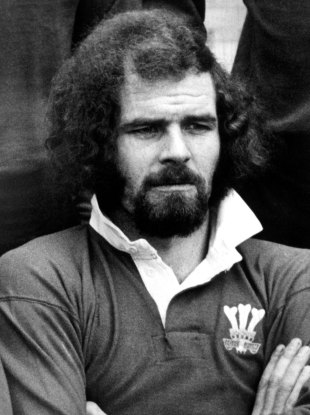|
Wales v Australia, Melbourne, June 16
A helping hand
John Taylor
June 14, 2012

ESPNscrum columnist John Taylor scored the winning try the last time Wales beat the Wallabies on Australian soil back in 1969
© PA Photos
Enlarge
Forty years on, June 21, 1969 has become a famous date because it was the last time Wales beat the Wallabies in Australia. I remember the game for all sorts of other reasons but it was not until somebody pointed out last week that I had scored what turned out to be the winning try on the only occasion we have won on Australian soil that I started to think of it as a piece of history. I have to say that the try itself was all down to Gerald Davies. He had already scored a brilliant try himself and then made another trade-mark, sidestepping run, drawing the fullback before giving me the scoring pass. It was a remarkable victory in that we came back from 11-0 down in an era when that was usually a winning lead but the whole occasion summed up the amateurism of rugby at the end of the 60s. Wales were on their first tour of the antipodes. We had won the Home Nations Championship (undefeated - a draw with France denied us the Grand Slam) but were brought sharply down to earth by two heavy defeats in New Zealand. Australia were so strapped for cash in those days they had apparently pleaded with the Welsh Rugby Union for a fixture on the back of the New Zealand tour so we stopped in at Sydney on our way to Fiji who were included because they had toured Wales for the first time in 1964. We were thrilled when we discovered the game would be played on the Sydney Cricket Ground - an iconic venue even if we were playing the wrong game - but most of us assumed there had to be room for a rugby pitch alongside the square. We were amazed when we arrived and discovered we were playing right across the hallowed turf. To make matters worse it was a miserable rainy day and by the time we had finished it was a real mess. I even apologised to the grounds-man or 'curator' to give him his proper title - 'No worries mate,' he reassured me. 'Spring is the season of miracles out here.' By that time we were all relaxing in the bar but the final quarter of the game had been totally bizarre. In those days the only neutral referees you had were in the Five Nations Championship. We flew - via Zurich, Rome, Tehran, Delhi, Singapore, Perth and Sydney, eventually arriving in Auckland 48 hours later - but the legacy from the days when the only way to travel to South Africa, New Zealand and Australia was by boat, continued with regard to referees. You had officials from the home Union - and they were homers, believe me. There was no point in questioning referees because you knew they were biased (the reason rugby has such a good reputation for accepting referees' decisions perhaps?). Before we left New Zealand, Colin Meads had warned me about Craig Ferguson, the top Australian referee - 'not good mate, I asked whose scrum it was and he said, "ours"' - but he seemed OK until we took the lead.
Suddenly, we could do nothing right. Every decision went against us but Australia could not capitalise. In the final minute they mounted one last attack and Maurice Richards, our superb left wing, tackled Arthur McGill, the Wallabies' fullback, into touch two or three metres short. In the mud his momentum carried him beyond the try-line and he reached inside and plonked the ball over the line. It was not touch and go (like the recent efforts from England's David Strettle against Wales in the Six Nations), the huge scar marks outside the line told the true story, but the Australian touch judge's flag stayed down and Ferguson gleefully awarded the try. Richards, a very untypical rugby player in that he was a non-drinker and a lay-preacher in his spare time, protested vehemently and became so incensed he called Ferguson 'a bloody cheat' - I truly believe it was the only time he ever swore. This was perfect for Ferguson. Australia were still trailing by five points but he immediately announced he was penalising Richards and the re-start would be an Australian penalty from half-way. McGill did his bit by kicking the conversion from the touchline but, fortunately for us, 50 yards was beyond his range. Their No.8, Alan Skinner, a renowned long kicker, was given the last shot but fell short and we escaped with the win. Afterwards, in the bar, I tackled Ferguson about his decision and he was totally unrepentant. 'Listen mate,' he said. 'Down here we've got four codes of football - Rules, League, Soccer and then there's Union, a very poor fourth. Our blokes need all the help they can get and I'm with them all the way.' Two years later I stepped off the plane in Sydney as a member of the 1971 Lions and there he was on the tarmac. 'Remember me mate,' he said. 'Craig Ferguson - I'm still a cheating b*****d and I'm refereeing on Saturday.' Happy days! © ESPN Sports Media Ltd. John Taylor is a former Wales and British & Irish Lions international and currently the managing director of London Welsh
| |||||||||||||||
Live Sports
Communication error please reload the page.
-
Football
-
Cricket
-
Rugby
-
- Days
- Hrs
- Mins
- Secs
F1 - Abu Dhabi GP
Abu Dhabi Grand Prix December 11-131. Max Verstappen ()
2. Valtteri Bottas (Mercedes)
3. Lewis Hamilton (Mercedes)
4. Alexander Albon ()
5. Lando Norris ()
6. Carlos Sainz Jr ()
-
ESPNOtherLive >>
Golf - Houston Open
Snooker - China Open
Tennis - Miami Open

